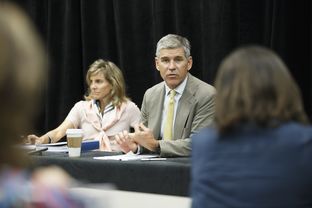Paul Hobby Wants Off Ethics Commission

Add Paul Hobby of Houston to the list of departing Texas ethics commissioners.
Hobby sent his resignation letter late last week to House Speaker Joe Straus, saying he’ll be gone as of the end of the month. That leaves Straus with an appointment to make, with an odd twist: He’ll be choosing from a list yet to be provided by House Democrats.
That’s how those appointments work: for Straus, for Lt. Gov. Dan Patrick and for Gov. Greg Abbott. They each pick from lists provided by Republicans and Democrats, with the idea that four from each party end up on the commission that regulates campaign finance, financial disclosures and other ethics laws in Texas.
Hobby listed some of the agency’s accomplishments during his tenure, closing with this: “We have continuously re-articulated the grand bargain that is the foundation of this agency. Enforcement powers are limited, but disclosure requirements are broad. In many courtrooms, state and federal, we have defended those disclosure statutes and have kept them intact.”
Tom Harrison resigned from the commission earlier this year. Both he and Hobby have served past the ends of their terms. Two more commissioners — Bob Long of Bastrop and Wilhelmina Delco of Austin — are also serving as holdover appointees. They’ll remain until their replacements are picked.
The Texas House Republican Caucus released a statement the next day with what it calls “clarifying guidance” on the process. After noting that Hobby — a Democrat — must be replaced by another Democrat, the caucus goes on to say:
“As of today, the House Republican Caucus has been reassured by Speaker Joe Straus that an appointment has not been made and that the vetting of potential candidates will begin after Democrat Members of the Texas House of Representatives have submitted all of their recommendations to the Speaker.
“As a Caucus, we have great confidence that Speaker Straus will select the best possible Democrat to serve on the Texas Ethics Commission.”
*****
Former Dallas Mayor Laura Miller has left Summit Power Group, the company behind the Texas Clean Energy Project, the unbuilt and over-budget “clean coal” power plant years ago promised to West Texas.
“I am no longer working with Summit but certainly hope they get to build a project in Penwell,” Miller wrote in an email late last week. “They're a great company that has worked diligently to make this project happen.”
Miller did not provide additional details on her departure or her next steps.
Miller, Dallas mayor in the mid-2000s, won accolades from environmentalists after fighting plans to build new coal plants in the city. After leaving office in 2007, she spent nearly a decade championing the Texas Clean Energy Project, which has yet to rise on 600 acres outside of Penwell.
That coal-fired power plant was supposed to capture its carbon dioxide emission and sell them to oil companies that would inject them into the ground to boost emissions.
Though some environmental groups support such efforts, others fiercely oppose them, preferring to keep all fossil fuels in the ground by completely doing away with coal-burning facilities.
As the Tribune reported last month, the project — nearly $2 billion over-budget, years behind schedule and unable to find financing — appears to be on life support, just one sign of tough times for similar efforts across the U.S.
The U.S. Department of Energy, which spent about $116 million on the project before freezing funding earlier this year, is now contemplating pulling the plug on all institutional support.
After pausing funding, the agency extended a temporary no-cost cooperative agreement to the company. Thursday was Summit’s deadline to plea for that support to continue.
The agency is now evaluating those materials. On Friday, it would not say when it will determine the project's fate.
"DOE is continuing to work with the company to determine the best path forward,” an agency spokeswoman wrote in an email.
Bret Logue, the coal project’s current director, said developers are continuing their push for support.
"TCEP is an important low carbon energy project and represents a significant investment, both public and private,” he wrote in an email Friday.

